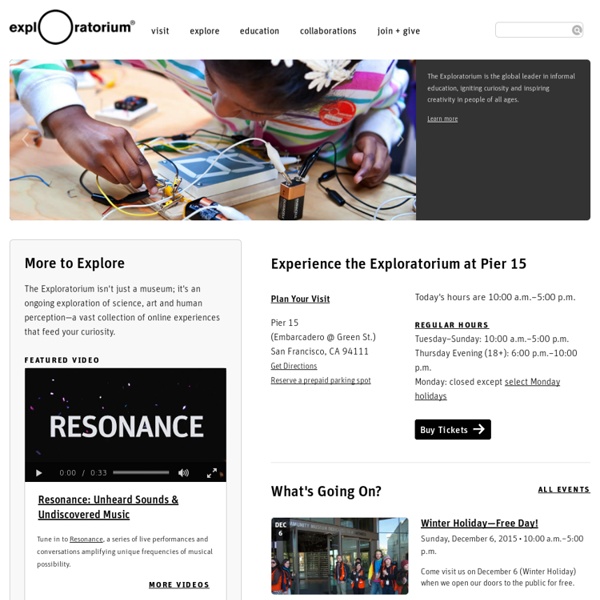



What’s the “problem” with MOOCs? « EdTechDev In case the quotes didn’t clue you in, this post doesn’t argue against massive open online courses (MOOCs) such as the ones offered by Udacity, Coursera, and edX. I think they are very worthy ventures and will serve to progress our system of higher education. I do however agree with some criticisms of these courses, and that there is room for much more progress. I propose an alternative model for such massive open online learning experiences, or MOOLEs, that focuses on solving “problems,” but first, here’s a sampling of some of the criticisms of MOOCs. Criticisms of MOOCs Khan Academy The organization is unclear and it lacks sufficient learner support.The videos aren’t informed by research and theory on how people learn, and this may diminish the effectiveness of his videos.
7 Man-Made Substances that Laugh in the Face of Physics The universe is full of weird substances like liquid metal and whatever preservative keeps Larry King alive. But mankind isn't happy to accept the weirdness of nature when we can create our own abominations of science that, due to the miracle of technology, spit in nature's face and call it retarded. That's why we came up with... Journal home : Nature Raphael Lis, Charles C. Karrasch, Michael G. Poulos, Balvir Kunar, David Redmond, Jose G. Barcia Duran, Chaitanya R. What Americans Keep Ignoring About Finland's School Success - Anu Partanen The Scandinavian country is an education superpower because it values equality more than excellence. Sergey Ivanov/Flickr Everyone agrees the United States needs to improve its education system dramatically, but how?
Discover Magazine dark matter Your hands are, roughly speaking, 360 million years old. Before then, they were fins, which your fishy ancestors used to swim through oceans and rivers. Once those fins sprouted digits, they could propel your salamander-like ancestors across dry land. Fast forward 300 million years, and your hands had become fine-tuned for manipulations: your lemur-like ancestors used them to grab leaves and open up fruits. Within the past few million years, your hominin ancestors had fairly human hands, which they used to fashion tools for digging up tubers, butchering carcasses, and laying the groundwork for our global dominance today. American Field Guide The American Field Guide site has been retired from pbs.org and is no longer available Produced in 2001 by Oregon Public Broadcasting, American Field Guide was an early experiment in online video for PBS. A unique local-national partnership, AFG presented a curated collection of over 1400 outdoors and recreation videos, produced by nearly 30 local stations around the country. Many of the programs and videos featured on AFG are still available through local station websites. Below is a list of participating programs and stations.
8 Books For a Higher Existence Books are magical inventions. By carrying meaning, they gives us glimpses of experience and knowledge from a different world. Phonetic language, being cut-off from time and place, the Now, helps both to encapsulate the ego more, but also to offer guidance to make it poriferous, letting Eros free. Without books we would lose this guidance.
Matrix mechanics Matrix mechanics is a formulation of quantum mechanics created by Werner Heisenberg, Max Born, and Pascual Jordan in 1925. Matrix mechanics was the first conceptually autonomous and logically consistent formulation of quantum mechanics. It extended the Bohr Model by describing how the quantum jumps occur.